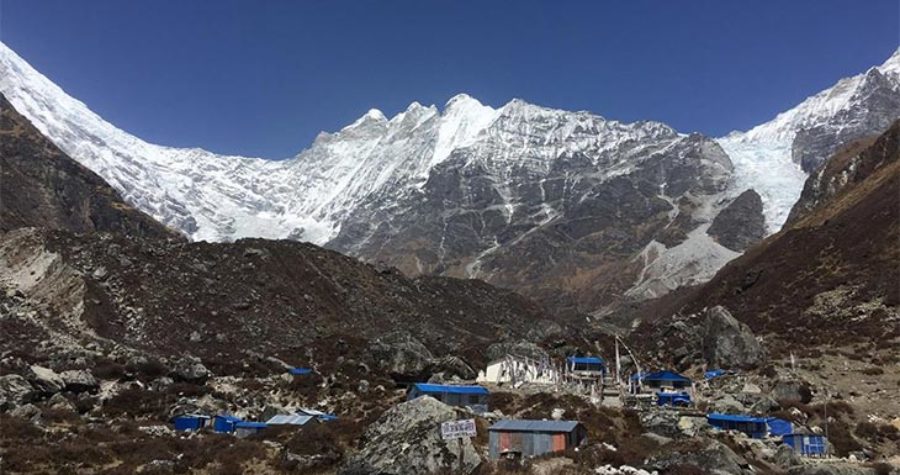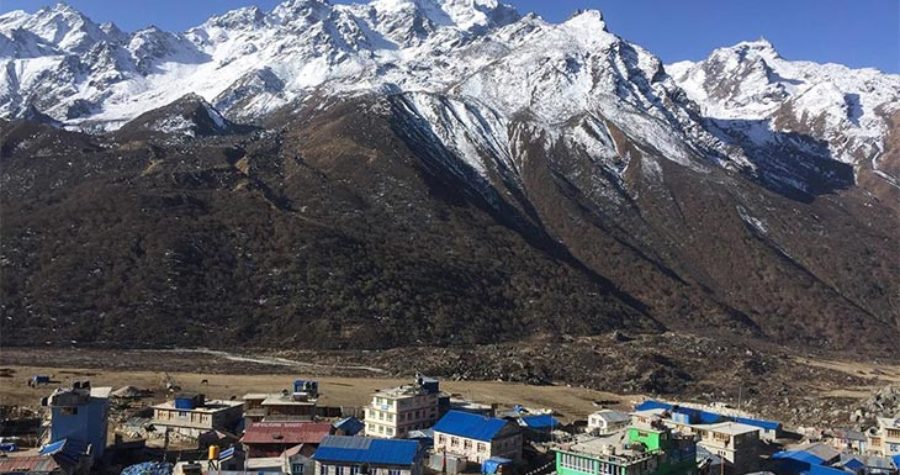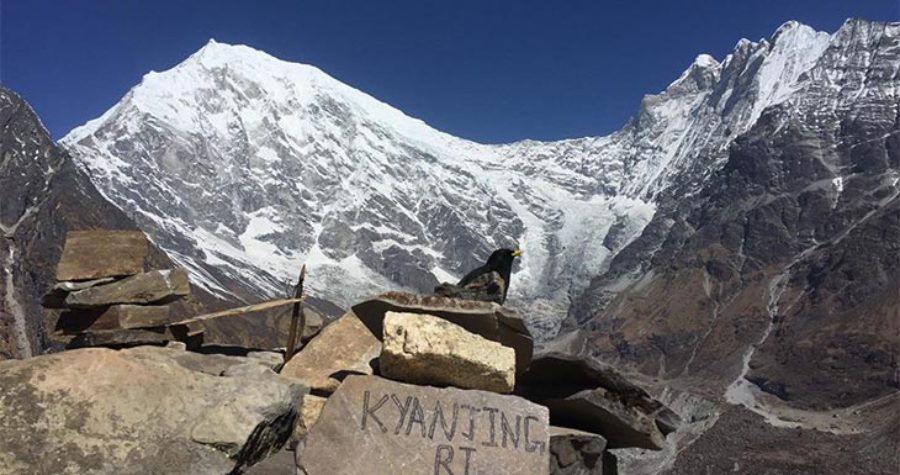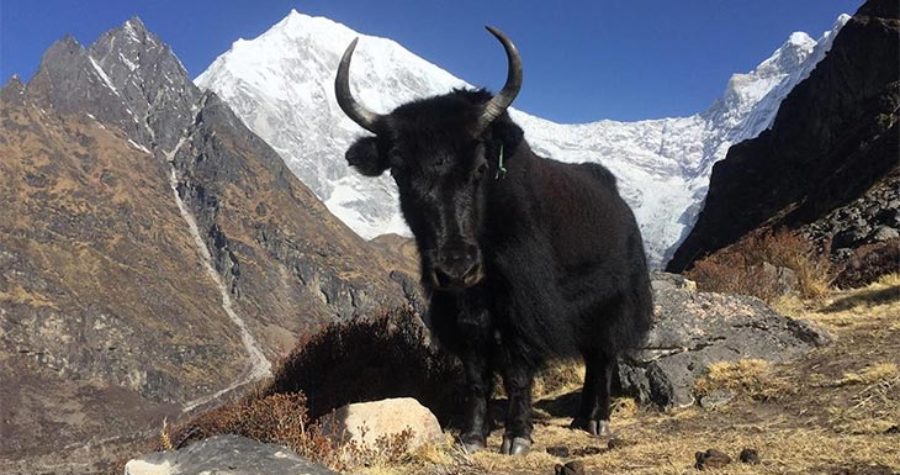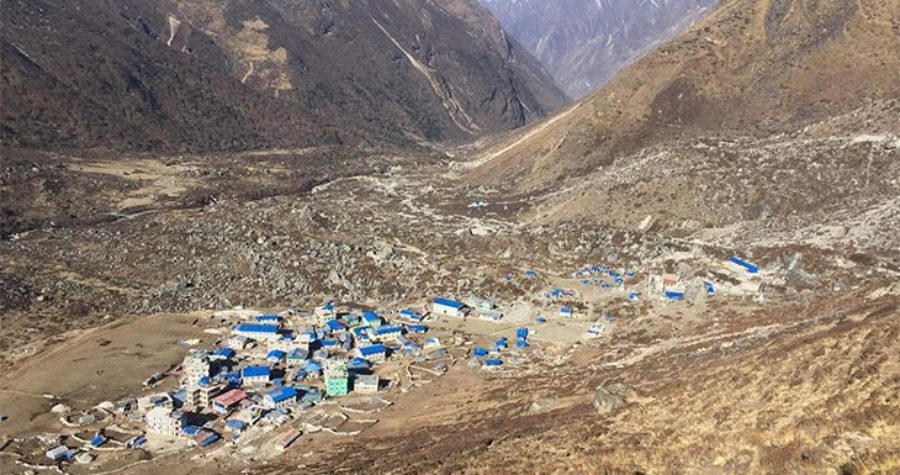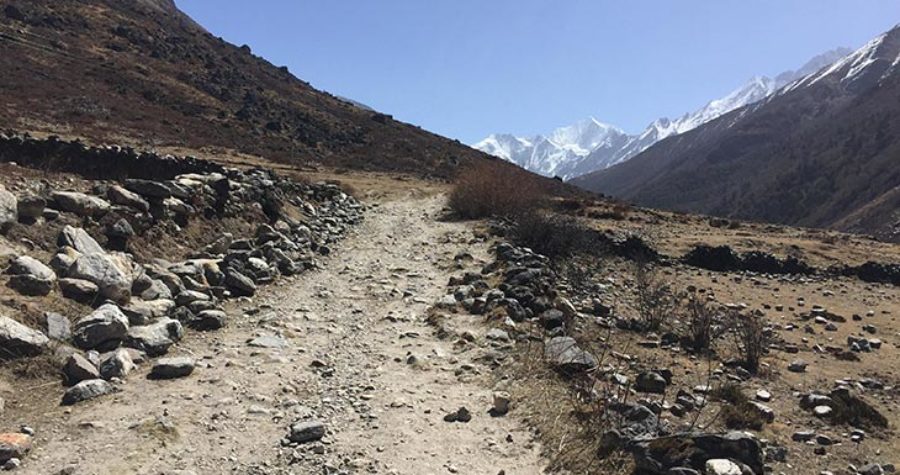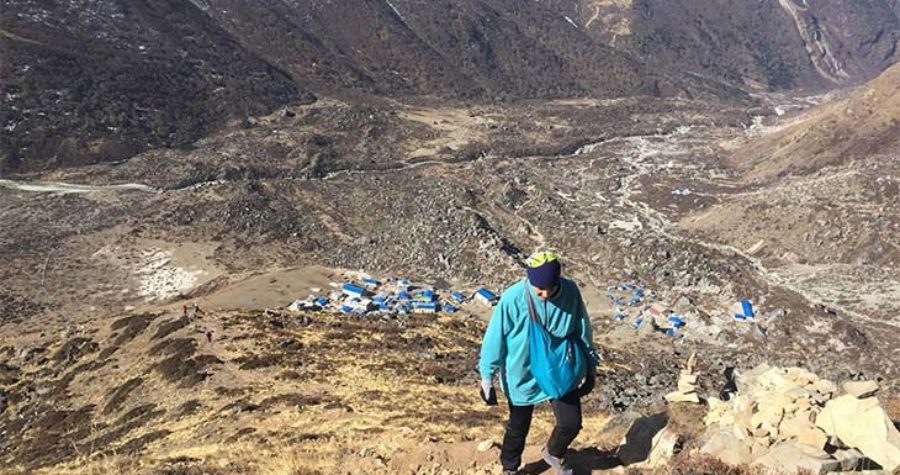Trip Highlights
- Beautiful Langtang National Park
- Traverse highest pass Ganja La (5,122 m)
- Hike to Tsergo Ri (5,033 m)
- Impressive Kyanjing Gompa
- Attractive Tamang villages
- Immerse yourself in the Himalayan lifestyle and culture of locals
- Phenomenal views of snow-capped peaks (Langtang Ri, Ganesh Himal, Lang Sisa, Chorkor Ri)
trip Overview
Ganja La Pass Trek is the extended Langtang trek. It takes you to the high Ganja La pass and is close to the overwhelming Himalayan views of the Langtang range. The upper Langtang Valley was explored about 6 decades ago but it has not changed much and has limited facilities. Therefore, the tented camp will be your accommodation and almost every requirement for the trip will have to carry along. Here the restriction on the use of firewood that’s why even the fuel needs to be carried. This is trekking as it was done half a century ago, but it had just started in Nepal!
Ganja La Pass Trek, like Langtang the Gosainkunda trek and Langtang Valley exploration trek, begins with a drive from Kathmandu to Syabru Besi. The itinerary overlaps with that of the Langtang Valley exploration trek as far as Tsergo Ri. From Tsergo Ri, we make some adventure trips through Ganja la Pass (5122 m) and other high settlements to the east to reach Helambu, the famous orchard of the region. This region of Nepal is still not much visited, so the trek gives you the feel of the pristine environment. Our trek ends with the journey-on-legs in Melamchi and from there return to Kathmandu in a vehicle.
The main highlights of the trek include the valleys of Langtang and Helambu; and also the Tibetan village at Langtang, and of course, the Ganja La Pass. There are chances that you can get breathtaking views of the Himalayan peaks such as Langtang Ri, Ganesh Himal, Lang Sisa, Chorkor Ri, and about 10 peaks over 6000 meters.
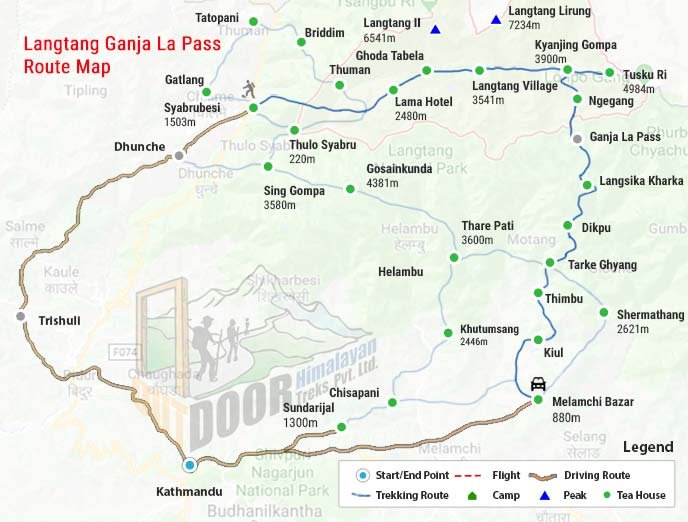
Itinerary
30 min Hotel
Arrive in Kathmandu and meet our airport representatives. They will accompany you to your hotel in a private car. After checking in, depositing your luggage and getting some rest, you can visit our office to meet your trekking guide.
Our staff will prepare all necessary documents for your trek. Please check the 'Guidelines' section for a complete list of required documents. In the meantime, you can enjoy a guided sightseeing tour to various interesting sites in Kathmandu, for which we will provide a private car.
8-9 hrs Teahouse
Your guide will pick up you at 6:30 am from your hotel and transfer to the bus station. At 7:00 AM catch a local bus to Syabru Besi via Kakani. The drive normally takes 8-9 hours, stopping at Trishuli Bazar for lunch, where we leave the tarred highway and head for Syabru Besi via Betrawati and Dhunche. We will settle you in a local teahouse for the night.
6-7 hrs Teahouse
We begin our trek today, walking for about 6-7 hours. After crossing the first bridge, the trek gets a bit harder as we climb uphill to Bamboo and stop for lunch. The final part of the trek is also not very easy as it involves uphill climbing before we finally reach Lama Hotel. During most of the course, we get excellent views to enjoy and also walk through the jungle in some places. The night will be spent in a local teahouse.
7-8 hrs Lodge/Teahouse
Starting early in the morning we resume our trek and today also our trail passes through forests, allowing us to enjoy cool weather and chirping of birds. At Nepal Army security check-point we shall stop for some time. After having walked for nearly 7-8 hours, we arrive in the village of Langtang where Sherpa and Tamang people form the majority of the population.
4-5 hrs Lodge/Teahouse
Our next destination is Kyanjing Gumba lying at a walking distance of about 4-5 hours. Splendid views of the Langtang Himalaya can be caught on clear days throughout our way. Kyanjing Gumba is also surrounded by the Himalayas. After lunch, you can visit one of the oldest yak cheese factories in Nepal and later view the beautiful sunset.
6-7 hrs Lodge/Teahouse
We shall make a side-trip to Tsergo Ri today and return to Kyanjing Gumba for the night. This usually takes 6-7 hours and we need to carry packed lunch due to unavailability of restaurants or teahouses on our way. Tsergo Ri is a famous trekking peak of Nepal which can be climbed without any special mountaineering gears. From there we can see the Langtang Himalayan range without any obstruction. When we have had enough viewing, we will return to our base, Kyanjing Gumba.
5 hrs Tent
After having a good night’s sleep we wake up early, freshen up and head for Ngegang, our next stopover. This usually means not more than normal paced walking for 5 hours. A big yak farm lies on our way at Langsisa Kharka and so does a glacier. Remember, tonight, we will be sleeping in a tent.
7-8 hrs Tent
Today is the day when we actually make our way up to Ganja La Pass (5122 m) after walking for nearly 7-8 hours. This happens to be the toughest part of our entire trip. We will spend enough time resting at the pass and taking photographs before descending down to Langsisa Kharka where we spend yet another night in a tent. Please be informed that the pass remains closed during winter.
6 hrs Tent
The first thing we do is pack up the tents and other items in the morning. Then we resume our trek, descending down to Dukpu. We will stop at a location suitable for setting up our tents and not farther than a walking distance of 6 hours. After a quick supper, we shall retire early for the night.
6 hrs Teahouse
We start walking after having made our preparations and trek down to Tarke Ghyang, a village mostly inhabited by Tamang people, approximately at a walking distance of 6 hours from Dukpu. In the evening we can explore the village if the weather is fine. Otherwise, we will just stay indoors, probably in a teahouse where we spend the night as well.
7 hrs Teahouse
After freshening up early in the morning we resume our trek, heading for Sermathang. It will take us about 7 hours to reach this village which is also included in other trekking routes of Helambu. Weather permitting, we shall explore a famous monastery and some parts of the village. After a local style dinner, we retire early for the night in a teahouse, as there lies a long walking day ahead.
7 hrs Teahouse
The final portion of our trek takes about 7 hours and our final stopover is the famous Melamchi Bazaar, a small town settled by the roaring Melamchi River. Nearly two decades ago, an ambitious project was proposed to channel the water from this very river to the valley of Kathmandu through a tunnel yet to be made. Melamchi Bazar is famous for locally produced organic vegetable and is a common junction of several trekking routes in the Helambu region. We will spend our night in a local teahouse.
6 hrs Hotel
After breakfast, we ride a local bus to Kathmandu. It takes about 6 hours and the first segment of the road up to Panchkhal is rough as it is only graveled and not tarred. From Panchkhal onwards, the drive is quite exciting and we head for Kathmandu via famous towns like Dhulikhel, Banepa and Bhaktapur. You will be transferred to your hotel. Enjoy a farewell dinner in the evening.
Depending upon your travel plan, you can choose to be transferred to the airport for departure or spend a few more days in Kathmandu or some other places in Nepal. You can consult with our experts whenever you need information or assistance.
Why book with us?
Outdoor Himalayan Treks, Founded by professionals with long experience in adventure and community-based tourism, the company is dedicated to delivering high-quality service to its clients.Experiences since 2004, 50% Repeated customers, Awarded on TripAdvisor
What's included
- Accommodation: Basic teahouse accommodation during the trek; tented camps for 3 nights (Ganja La vicinity); deluxe accommodation for 3 nights in Kathmandu (either at Hotel Friends Home or Hotel Mums Home)
- Meals: 3 meals per day (breakfast, lunch and dinner, which you can choose from the menu) during the trek; hygienic meals (including tea/coffee and boiled drinking water) prepared by our cook during the camping days; breakfast in Kathmandu
- Transportation: Airport - hotel - airport transfers and sightseeing by car; Kathmandu - Syabru Besi and Melamchi - Kathmandu by bus
- Documentation: Trekking permit (Langtang National Park entry permit); Trekkers' Information Management System (TIMS) card
- Equipment/Accessories: Trekking poles, down jacket, sleeping bags, first-aid kit, water purifying solution (iodine-based); kitchen and camping equipment (tents, stove, utensils, etc.)
- Human resource: A professional and experienced trekking guide (English-speaking); two porters per trekker (for carrying the tents and other equipment, and food); a cook to prepare and serve meals during the tented camps. All the expenses for this personnel are covered (wages, accommodation, meals, transportation, insurance, etc.)
- Tax/Service Charge: All applicable taxes, service charges or fees. We hereby guarantee you of no 'hidden charges' afterward.
- Complimentary: Farewell dinner in Kathmandu (authentic Nepalese cuisines with the live cultural show)
- Emergency Rescue Service: Should any emergency arise during your trek, we will provide prompt and professional rescue and medical services. However, you must be already insured for such emergencies, and your insurance policy must cover helicopter evacuation. Moreover, you should provide your policy details and authorize us to deal directly with your insurance company on your behalf.
What's not included
- Beverage (cold drinks, bottled mineral water, tea/coffee, etc.)
- Any other expenses of a personal nature (extra meals, battery charging fees, photography charges, etc.)
- Tips or donations
- Your travel insurance
Guidelines
Accommodation
Teahouses or Lodges are accommodation types during the Ganja La Pass trek that provide basic facilities but are comfortable to stay in. Generally, bathrooms are outside the teahouses. In higher regions, a tent is the means of accommodation. Read More
Meals
3-course full board meals are served during the Ganja La Pass trek which are healthy and hygienic. Breakfast and dinner are served from the teahouses and lunch is served at the stopovers during the trek. Our cook prepared a meal during the tented camping. Read More
Drinking water
Drinking water during the Ganja La Pass trek is easily available. Trekkers can buy Mineral Water, fill tap water, or boiled water at teahouses as their preference. Boiled water is provided during the tented camping. Read More
Transportation during the Ganja La Pass Trek
- Kathmandu - Syabru Besi and Sundarijal - Kathmandu by bus
Best Time for Ganja La Pass Trek
The ideal seasons for the Ganja La Pass trek are Spring (Mar-May) and Autumn (Sep-Nov) as the weather and temperature are stable and offer incredible vistas. Read More
Trekking Permits for Ganja La Pass Trek
Ganja La Pass trek requires compulsory two permits i.e. Langtang National Park (LNP) and the Trekkers Information Management System (TIMS). Read More
Ganja La Pass Trek Difficulty
Ganja La Pass is a difficult-graded trek with a maximum elevation of 5,122 m. Walking daily long hours on the steep ascending and descending rough trails can be challenging for trekkers. Altitude gain can be a big concern during this trek. Read More
Altitude Sickness in Ganja La Pass Trek
The maximum elevation during the Ganja La Pass trek is 5,122 m (Ganja La Pass). Hence, there is a chance of getting altitude sickness and acclimatization rest is essential to prevent it. Read More
Fitness Level
Ganja La Pass trek demands trekkers to have top-notch fitness levels. Trekkers should be physically and mentally sound to join this trek. With proper preparation, good physical fitness, and following the guide’s instructions Ganja La Pass trek is achievable. Read More
Skills
Your familiarity with the mountainous terrain and previous trekking experience will be plus points.
Travel Insurance
It acts as a safety net and is essential for trekking. We recommend getting travel insurance from a reputed company.
- Make sure that you are insured against cancellations, accidents, health, emergency evacuation and loss, theft of, or damage to, baggage, and personal effects.
- In emergencies, we will arrange for a helicopter rescue, medical treatment, and aftercare for you. All these costs shall be borne by your travel insurance company.
Required Equipment/Gears
Ganja La Pass is a difficult-graded trek. Since no technical climbing is involved it only requires basic equipment and gear that trekkers can hire or bring on their own. Read More
Documents required
- Scanned copies of passport-sized photos and passports of each participant
- Travel Insurance
- Langtang National Park (LNP) Permit
- TIMS
FAQs
Why trekkers should do Ganja La Pass Trek?
The Ganja La Pass Trek is a challenging and adventurous trekking route that takes you through the stunning Langtang Valley and over the high-altitude Ganja La Pass. It offers breathtaking mountain views, diverse landscapes, and a thrilling alpine crossing.
How long does it take to complete the Ganja La Pass Trek?
The Ganja La Pass Trek usually takes around 14 to 16 days to complete, depending on the itinerary and your trekking pace.
Do I require previous trekking experience for the Ganja La Pass Trek?
Yes, previous trekking experience is highly recommended for the Ganja La Pass Trek. It is a strenuous and challenging trek that involves steep ascents, long hours of walking, and navigating difficult terrain. Good physical fitness and prior trekking experience will enhance your safety and enjoyment.
How are accommodations and drinking water in the Langtang Ganja La Pass Trek?
Accommodation along the Langtang Ganja La Pass Trek consists of basic teahouses or lodges. In higher regions, a tent is the means of accommodation. It's recommended to purify or treat water for drinking during the trek. Carry a water bottle and water purifying kits as bottled water may not be readily available.
What is the best time to do the Ganja La Pass Trek?
The best time for the Ganja La Pass Trek is during the Spring (Mar-May) and Autumn (Sep-Nov) seasons. These months offer clear skies, stable weather conditions, and moderate temperatures, making for a safer and more pleasant trekking experience.
What permits do I require for the Ganja La Pass Trek?
The permits you require for the Ganja La Pass Trek are the Langtang National Park entry and the TIMS (Trekkers Information Management System) card. Your trekking agency or guide can assist you in obtaining these permits.
How physically challenging is the Ganja La Pass Trek?
The Ganja La Pass Trek is considered physically challenging due to its duration, high altitude, and tough terrain. It involves long days of walking, steep ascents and descents, and crossing the Ganja La Pass. Trekkers require excellent physical fitness, endurance, and mental preparation are essential.
What is the altitude-related risk on the Ganja La Pass Trek?
Altitude sickness is a common altitude-related risk during the Ganja La Pass Trek. To prevent altitude sickness, trekkers must take proper acclimatization rest. Thus, it is recommended to have rest days and ascend gradually. It is essential to be aware of the symptoms of altitude sickness and take necessary precautions.
Is a guide compulsory for the Ganja La Pass Trek?
Yes, hiring a licensed guide is highly recommended for the Ganja La Pass Trek due to its challenging nature. A guide ensures your safety and offers valuable insights about the region. A porter can help carry your heavy backpack making your trek experience comfortable.
Are there any emergency rescue services available during the Ganja La Pass Trek?
Emergency rescue services, including helicopter evacuation, are available during the Ganja La Pass Trek, and having travel insurance that covers emergency evacuation is vital.
What are the packing essentials for the Ganja La Pass Trek?
Packing for the Ganja La Pass Trek requires careful consideration. Some essential items include sturdy trekking boots, warm clothing (including a down jacket and thermals), a sleeping bag, trekking poles, a hat, gloves, sunglasses, sunscreen, a first aid kit, and high-energy snacks. Consult with your trekking agency for a detailed packing list.
CANCELLATION
- Free cancellation up to 60 days prior departure
- 30% of the total cost of the trip will be charged if cancelled between 60 to 30 days prior to departure date
- 60% of total cost of the trip will be charged if cancelled in between 30 to 14 days prior to departure date.
- No refund will be provided if cancelled within 14 days prior of departure date.
- No refunded will be provided if the guest will not show up.
- Regrettably, in case where the trek/tour can not be completed due to customer's own problem or sickness or unfavourable weather there will be no refund.
- If the trekking/tour is extended more than given itinerary extra charge will be applied accordingly
- If the agreed trip can not be organised due to bad weather or any unforeseen events, similar trip will be organised (in the mutual understanding with the travellers)



